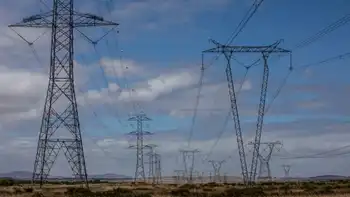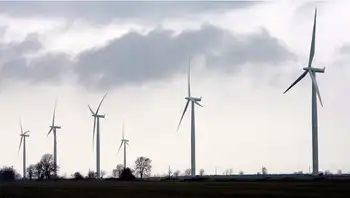Power bills could drop if utilities merge
ANCHORAGE, ALASKA - Anchorage-area consumers could enjoy substantial savings on their power bills if the city's two electric utilities merged or combined some of their operations, a new study shows.
Savings in average retail electric rates for the two utilities - Chugach Electric Association and Municipal Light & Power - could top $200 million over the coming decade under one merger option, says the study from Chicago-based Navigant Consulting Inc.
Chugach and the city of Anchorage, which owns ML&P, hired Navigant to do the study. The 127-page report is likely to become a focal point for debate on a problem that affects everybody living here: How to make and supply electricity at the cheapest cost?
Ron Nichols, a veteran electric utility consultant with Navigant, said now is a key time for Chugach and ML&P to consider joining forces.
Both utilities have old generation plants in need of upgrades or replacement, both are small as U.S. electric companies go, and each serves customers that, in some cases, are literally on opposite sides of the same streets. Merging the two, or having them collaborate on certain operations, makes sense to streamline costs and save consumers substantial money on their monthly power bills, Nichols said. "If ever there were a time to consider doing something jointly, now is that time," he said.
Chugach is an electric cooperative and the state's largest power utility, serving 64,300 members.
Its coverage area includes most of Anchorage, the northern Kenai Peninsula, Whittier and Tyonek on the western bank of Cook Inlet. It also sells much whole ale power to the state's other major utilities. ML&P has about 30,000 customers, but its retail power sales approach Chugach's because many of its customers, in the downtown and Midtown business districts, are large commercial and institutional users.
Chugach and ML&P representatives resolved ahead of time not to discuss the substance of the report, which will be analyzed by a joint oversight panel chaired by Anchorage Mayor Mark Begich and Chugach board chair Elizabeth Vazquez.
Others who read the report had mixed reviews. Steve Cleary, director of the Alaska Public Interest Research Group, said he was encouraged that Nichols identified several potential options to cut power costs and save ratepayers money.
"The bottom line for us is, they're thinking ahead and trying to plan for electricity use in the future," he said. "That's the good news for consumers."
"It's a good first step," said Lorali Carter, spokeswoman for Matanuska Electric Association, a Palmer-based utility that buys much of its power from Chugach. However, Carter said the study needs to be expanded to look at the idea of a "generation and transmission cooperative" where all six so-called Railbelt utilities from Fairbanks to Homer would work together on new power plants, which might be cheaper than utilities working individually.
MEA, which is Chugach's largest electric customer, has asked the Regulatory Commission of Alaska to consider forming such a cooperative.
Ray Kreig, a former Chugach board member and chair of Chugach Consumers, an advocacy group for Chugach ratepayers, said he was disappointed in the Navigant study.
"It's a strange report," he said. "Everybody knows there is immense amounts of money to be saved by combining these two utilities," Kreig said. However, he said the study seems biased toward having a government owner of the utilities, which might not yield as much efficiency and savings as private ownership.
And the study should have considered broader issues such as how to create more competition in Alaska's electricity market, he added. Nichols evaluated seven cases for combining some or all aspects of Chugach and ML&P. Some would save ratepayers a great deal of money, while others would actually increase costs, Nichols said. Some examples:
- It would be better for consumers if ML&P bought Chugach, not the other way around. The reason is because the government-owned ML&P can borrow money more cheaply - by issuing tax-exempt bonds - than can Chugach. If ML&P bought Chugach, savings would be $168 million over the 12-year period from 2009-2020. If Chugach bought ML&P, utility costs would actually increase by $45 million. Nichols cautions, however, that whether the city and ML&P could take advantage of tax-exempt financing to acquire Chugach needs more review by legal and bond experts.
- If a private company bought both Chugach and ML&P, costs would rise by $243 million. Again, the higher cost of financing is a major factor, Nichols said.
- If a separate government entity acquired both utilities, the savings would be $218 million.
- In another option attractive to Nichols, the two utilities could merge most staff and certain operations and invest together in a one new, large, gas-fired power plant - instead of two smaller plants, as the utilities are now planning - and save $18 million.
Even if the utilities did nothing else but join forces on the single power plant, they could save big costs - $86 million, according to the Navigant study. The study also touches on the subject of the Beluga natural gas field on the west side of Cook Inlet. Because the city owns part of the field, ML&P has been somewhat immune to the national rise in natural gas prices and so its costs and rates are lower.
If ML&P and Chugach merged, two sets of rates could be used so former ML&P customers could continue to enjoy the lower rates the Beluga investment afforded, Nichols said.
Related News

Tucson Electric Power plans to end use of coal-generated electricity by 2032
TUCSON - In a dramatic policy shift, Tucson Electric Power says it will stop using coal to generate electricity by 2032 and will increase renewable energy's share of its energy load to more than 70% by 2035.
As part of that change, the utility will stop buying electricity from its two units at its coal-fired Springerville Generating Station by 2032. The plant, TEP's biggest power source, provides about 35% of its energy.
The utility already had planned to start up two New Mexico wind farms and a solar storage plant in the Tucson area by next year. The new plan calls for…




